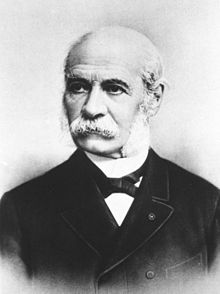Paul Janet

Paul Janet | |
|---|---|
 | |
| Born | 30 April 1823 Paris, France |
| Died | 4 October 1899 (aged 76) |
| Known for | Théorie de la morale |
| Scientific career | |
| Fields | Philosophy |
| Institutions | University of Bourges, Strasbourg, Sorbonne |
Paul Alexandre René Janet (French pronunciation: [pɔl alɛksɑ̃dʁ ʁəne ʒanɛ]; 30 April 1823 – 4 October 1899) was a French philosopher and writer.
Biography
[edit]Born in Paris, he became professor of moral philosophy at Bourges (1845–1848) and Strasbourg (1848–1857), and of logic at the lycée Louis-le-Grand, Paris (1857–1864). In 1864 he was appointed to the chair of philosophy at the Sorbonne, and elected a member of the academy of moral and political sciences.
He wrote widely on philosophy, politics and ethics, on idealistic lines: La Famille, Histoire de la philosophie dans l'antiquité et dans le temps moderne, Histoire de la science politique, Philosophie de la Revolution Française, etc. However, in the opinion of Encyclopædia Britannica (11th edition, 1911), these writings are not characterised by much originality of thought. In philosophy he was a follower of Victor Cousin, and through him of G. W. F. Hegel. His principal work, Théorie de la morale, owes much to Immanuel Kant.
Charles Darwin was familiar with Janet's ideas, but thought that he had not well understood the theory of natural selection, as he indicated in a letter of 1866 to Alfred Russel Wallace:[1]
As for M. Janet he is a metaphysician & such gentlemen are so acute that I think they often misunderstand common folk.
Works
[edit]- The Materialism of the Present Day, a Critique of Dr. Büchner's System, London: Williams and Norgate, 1865 (translated of the original French work into English by George Masson), ISBN 1152057863
Notes
[edit]This article includes a list of general references, but it lacks sufficient corresponding inline citations. (January 2014) |
- ^ Burkhardt, F.; Evans, S.; Pearn, A., eds. (2008). Evolution: Selected letters of Charles Darwin 1860–1870. Cambridge University Press. pp. 146–148. ISBN 978-0-521-87412-0.
References
[edit]- This article incorporates text from a publication now in the public domain: Chisholm, Hugh, ed. (1911). "Janet, Paul". Encyclopædia Britannica (11th ed.). Cambridge University Press.